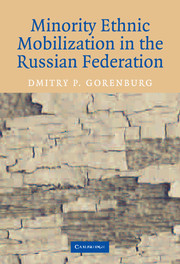Book contents
- Frontmatter
- Contents
- List of Figures and Tables
- Preface
- 1 Minority Ethnic Mobilization in Russia: An Introduction
- 2 Explaining Ethnic Mobilization: The Role of Ethnic Institutions
- 3 From Cultural Society to Popular Front: The Formation and Development of Nationalist Organizations
- 4 The Soviet Institutional Legacy and Ethno-Nationalist Ideology
- 5 Institutions Matter: Measuring Support for Nationalism
- 6 Intragroup Variation in Support for Nationalism: Not All Ethnics Are the Same
- 7 Outcomes: Did Regional Governments Adopt the Nationalist Agenda?
- 8 The Larger Picture: Support for Nationalism in Russia's Other Republics
- 9 Institutions and Nationalism
- Appendix: Construction of Variables and Indices
- References
- Index
2 - Explaining Ethnic Mobilization: The Role of Ethnic Institutions
Published online by Cambridge University Press: 15 December 2009
- Frontmatter
- Contents
- List of Figures and Tables
- Preface
- 1 Minority Ethnic Mobilization in Russia: An Introduction
- 2 Explaining Ethnic Mobilization: The Role of Ethnic Institutions
- 3 From Cultural Society to Popular Front: The Formation and Development of Nationalist Organizations
- 4 The Soviet Institutional Legacy and Ethno-Nationalist Ideology
- 5 Institutions Matter: Measuring Support for Nationalism
- 6 Intragroup Variation in Support for Nationalism: Not All Ethnics Are the Same
- 7 Outcomes: Did Regional Governments Adopt the Nationalist Agenda?
- 8 The Larger Picture: Support for Nationalism in Russia's Other Republics
- 9 Institutions and Nationalism
- Appendix: Construction of Variables and Indices
- References
- Index
Summary
Institutions are often considered the most important force in shaping ethnic identities. This is so because they are seen as defining not just the options available to political actors or the actors' preferences, but also the actors' self-definitions. Institutions are defined as “the formal or informal procedures, routines, norms and conventions embedded in the organizational structure of the polity” (Hall and Taylor 1996, 938). Institutions affect politics in two crucial ways. First, institutions create enforcement mechanisms for agreements, assess penalties for violating the agreements, and control the flow of information, thus constraining the strategies pursued by actors in the political arena. By limiting the realm of the possible in politics, institutions force political actors to choose from a limited menu of options. Second, the institutional context shapes not only the strategies, but also the preferences and goals of political actors. Institutions influence preferences by providing cognitive and moral templates that actors can use to interpret and analyze a situation and possible courses of action. They have great power over political activity because they not only shape the ability of individuals to pursue their interests, but also structure the nature of the interests themselves (Hall and Taylor 1996, Thelen and Steinmo 1992).
The effects of institutions are not limited to shaping preferences. Through their control of information and their ability to set the rules of political competition, institutions also influence how political actors perceive themselves.
- Type
- Chapter
- Information
- Minority Ethnic Mobilization in the Russian Federation , pp. 27 - 48Publisher: Cambridge University PressPrint publication year: 2003



